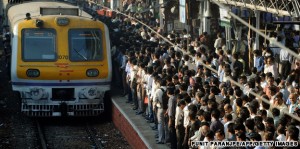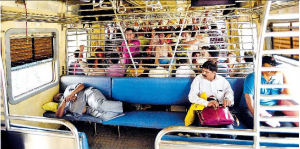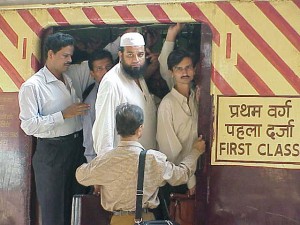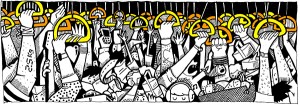“Abbé aee— first class hain, First. Chal peeche waala dabba mein ja,” (this is first class, go to the compartment behind) is a common refrain that can be heard in the suburban trains of Mumbai day after day. Depending on the time of the day, the tone and the tenor of the words change; it will be irritated and scruff in the mornings and evenings during the peak hours when space is at a premium and it will be calm and brotherly during the afternoon, or late at night when there is much space around.
In 10 cases out of 10, the admonishment above would have been uttered and directed at a person based on how he looks and what he wears. If a man is a short, black fella with oil in his hair and in chappals or slippers, if he is wearing faded shirt and a worn out pant, if he carrying a common bag on his back, a cheap mobile in his pocket; he (don’t know if it happens in a she-compartment) is most likely to be reprimanded so, and reminded of his status in the scheme of trains. In most cases, the man uttering this phrase is right in his judgement, as ridiculed one would look around confused and dazed, and would scamper out to squeeze himself in the ‘other compartments’ meant for him. In this way the ‘premium’ness of the First Class is assiduously protected. And rightfully too, after all the fares of the First Class are around thrice and more of the Second Class, there are just 3 coupes of First in a train of 12. This economic barrier is what ensures that a corporate executive travels to work comfortably while reading news from a pink paper, and poor peon hanging for his life and trying not to become one.
Honestly speaking, there is no real physical difference between the First and Second Class in the suburban trains, at least no discernible one. Both arrive at the station simultaneously, the interiors are the same, and so are the exteriors. Even the seats are the same, and the pattern of seating. It is not as if, after paying a premium you are showered with fresh scented air, or extra leg space or something. Neither do you have the privilege to disembark first or something, like you have in planes. In fact, travelling in either class is the same, what really changes is kind of gentry, and so the attitude of the traveller based on his or her perceptions. Thus, a First Classer is much gruff around with his personal space, they will only seat 3 on a seat that on a supposed to seat 3, unlike in the Second Class, where they always ‘adjust’ 4, and even more based on size of the occupants.
It is not as though, that the First Class is any less crowded than the Second Class. If at all it is more crowded, as the gentry that travels in them is much less accommodating and unfriendly. But then, the First-Classian has the option of squeezing himself in the Second Class if he likes or finds space, unlike his lesser brother, who would be roundly shooed away or heftily penalised.
Though in a manner of speaking, travelling in a First Class in a peak hour is a scented affair, as your nostrils would be sniffing Calvin Klein, Bvlgari and so on, while in the Second class you are just sniffing at rustic perspiring armpits. And so the sanctity of the First Class is valiantly protected.
But then it is not all about discrimination as it might seem, there is also an element of good samartanism at work. Considering that the First Class is the favourite hunting ground for the wily ticket-checkers, who impose a hefty fine on non-First Classians, the man shooing away the ‘backward’ bugger, often feels he is doing him a favour, protecting him from falling into the ‘Class trap’ and being fined heavily. Thus the discrimination is actually for the good of the one who is discriminated against. Even when he utters and debunks his fellow man, the First Classian feels no guilt or shame, as he is doing it as a part of all in the compartment. This is a sort of collective response that has been arrived at over a long period of time, and will be perpetuating for a long time to come.
In a manner, methinks, the suburban train mirrors and confirms to the law of the society we live in. The discrimination we see around in the form of caste is actually economics at
work. Just like a person belongs to First or Second Class based on the ticket he can afford or rather, afford not. Similarly, the backward class guy is unable to break-free from the shackles that bind him because of his economical deprivation that stalls his alleviation.
And yet, ironically, there is no real difference between the two classes (in train and in life), both are structured same, head in the same direction and even arrive at the same time. The only difference is that of perception, created by just a set of alternating red-white lines that indicate this is First and this is not. These few lines demarcate the boundary, these few lines are the icons that perpetuate pride and are relics that need be guarded. Even when the terrorists had attacked the trains by placing bombs in them, they had put so in the First Class, as they thought they were targeting privileged people.
Till this perception is not destroyed, wherein either the whole train is painted in red-white or the 3 places where it is painted, are repainted as the rest, the “abbé ae, yeh First Class hain” statement will abound, hurled mornings and evenings at the ears of the unworthy, like some gangajaal from a holy kamandal. Differences of class and caste are actually just perceptions that get enshrined over time, wherein the people so compartmentalised start behaving in a manner that is expected of them. A First Class-walla guarding his privileged place, while a Second Class-fellow struggling to find his own. That s the law of life, of Manu and of train travel in Mumbai.
 But then, on ‘Second’ thoughts, considering I am sitting comfortably in that white-red compartment, smelling Axe Effect and typing out this long post, while in just the next boogie, there are buggers who are fighting and hurling unmotherly-endearments for just a toe-sufficient space; would I really want to part of the crowded mêlée that comes with destruction of class? Would one really wish for an egalitarian society, where there was no incentive to strive harder, just so you could then afford some comforts and a little extra elbow space? If everyone was entitled to the same, would you ever wish to strive for more? So, in the end, would you really wish for a classless society (brought by the enterprise of money and not the accident of birth) or a classless train? Tough one to answer if you aren’t a Mahatma (who had to be thrown out of a First Class to become one) or a hypocrite…
But then, on ‘Second’ thoughts, considering I am sitting comfortably in that white-red compartment, smelling Axe Effect and typing out this long post, while in just the next boogie, there are buggers who are fighting and hurling unmotherly-endearments for just a toe-sufficient space; would I really want to part of the crowded mêlée that comes with destruction of class? Would one really wish for an egalitarian society, where there was no incentive to strive harder, just so you could then afford some comforts and a little extra elbow space? If everyone was entitled to the same, would you ever wish to strive for more? So, in the end, would you really wish for a classless society (brought by the enterprise of money and not the accident of birth) or a classless train? Tough one to answer if you aren’t a Mahatma (who had to be thrown out of a First Class to become one) or a hypocrite…


